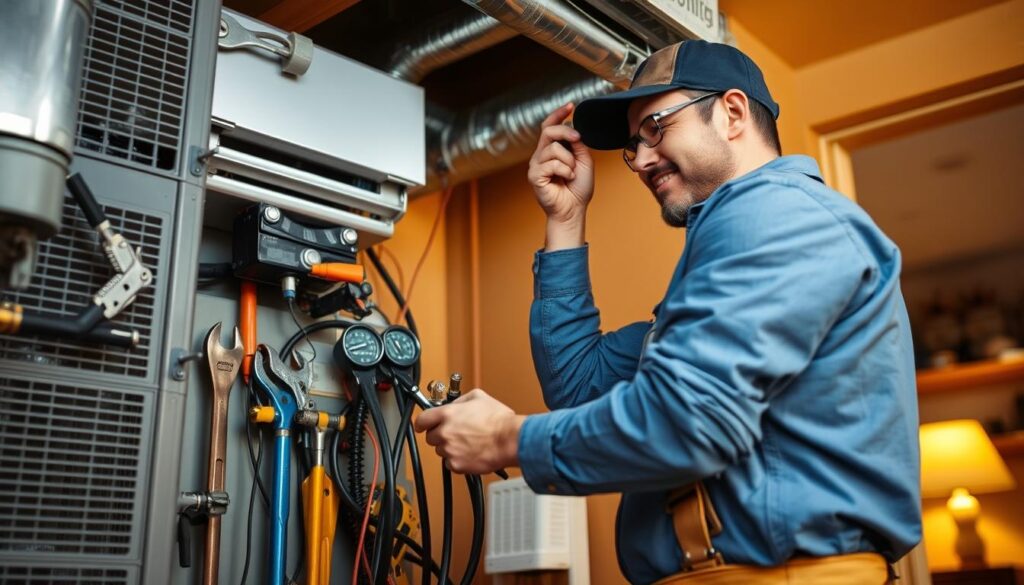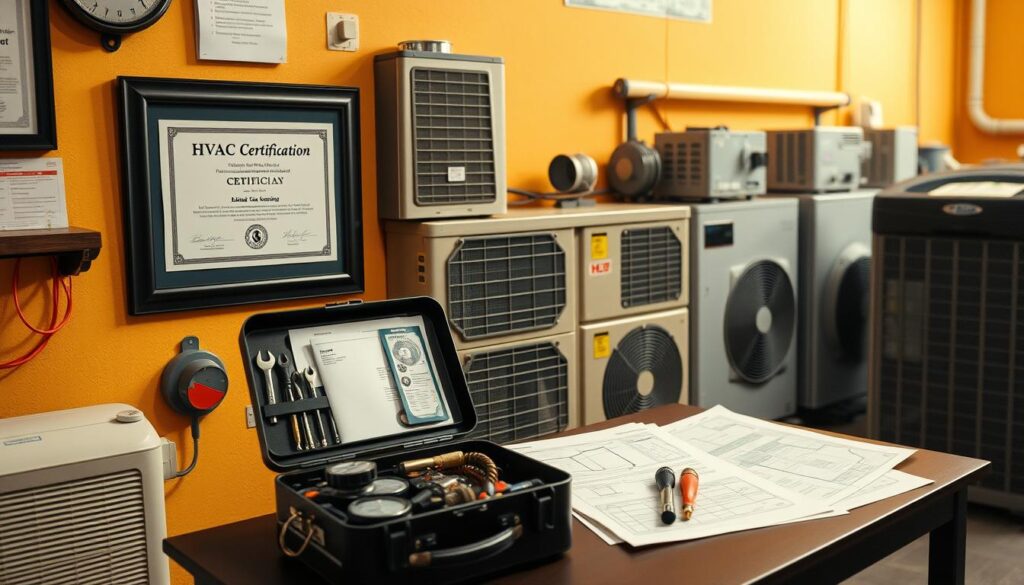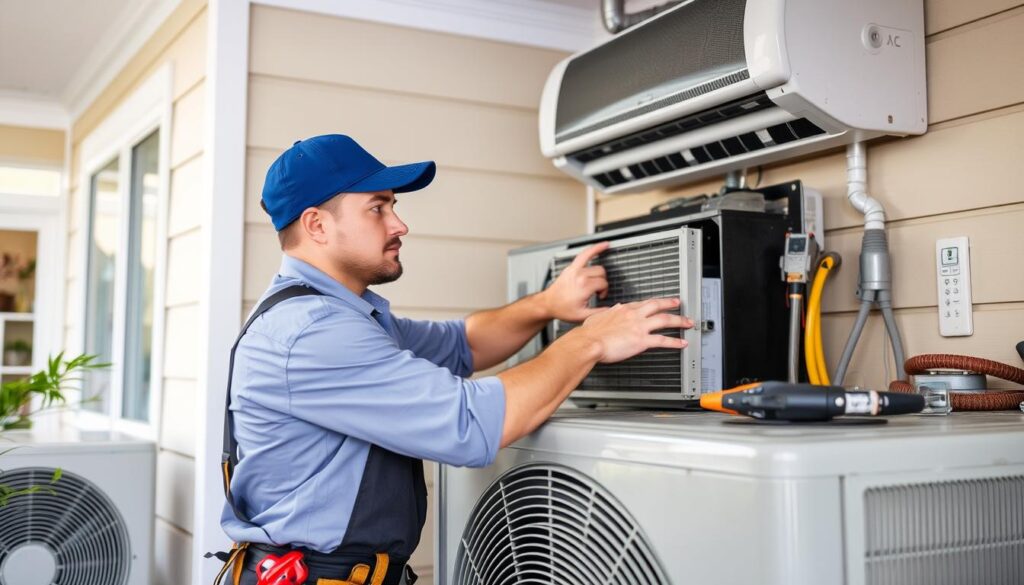Affiliate Disclosure
HVAC Guide Guys is a participant in the Amazon Services LLC Associates Program, an affiliate advertising program designed to provide a means for sites to earn advertising fees by advertising and linking to Amazon.
Can Handyman Do HVAC? “The difference between successful people and others is how long they choose to stay discouraged.” – John C. Maxwell
Many homeowners rely on handymen for their handy work. But, when it comes to HVAC systems, things get a bit tricky. We’ll look into the laws, risks, and smart ways to handle handymen and HVAC services.

Key Takeaways:
- Most states have strict rules for unlicensed handymen on HVAC systems.
- Handymen can’t do plumbing, electrical, or HVAC work without the right licenses.
- They can’t act as subcontractors or pretend to be licensed contractors.
- HVAC needs special skills, tools, and follows local codes, which handymen often lack.
- It’s best to hire licensed HVAC pros for safe, efficient, and compliant services.
Table of Contents
Understanding HVAC System Complexity
HVAC systems are complex networks that control temperature, humidity, and air quality in buildings. They need specialized knowledge to maintain and repair. Working on an HVAC system without proper training is dangerous and can cause serious safety issues.
Components of Modern HVAC Systems
A typical HVAC system has several key parts, including:
- Compressor: The heart of the system, responsible for circulating refrigerant and generating cooling power.
- Condenser: Dissipates heat from the refrigerant, allowing it to condense into a liquid state.
- Evaporator: Absorbs heat from the air, causing the refrigerant to evaporate and cool the air.
- Ductwork: A network of air ducts that distributes the conditioned air throughout the building.
- Thermostat: Controls the temperature and settings of the HVAC system.
- Filters: Remove dust, debris, and other pollutants from the air, ensuring indoor air quality.
Technical Requirements for HVAC Work
Proper HVAC maintenance and repair need a deep understanding of the technical aspects. This includes:
- Refrigerant handling: HVAC technicians must be trained and certified to safely handle and manage refrigerants, which can be toxic and environmentally harmful if mishandled.
- Electrical systems: HVAC systems rely on complex electrical components, and technicians must have the skills to diagnose and repair electrical issues safely.
- Mechanical operations: Maintaining and repairing the mechanical components of an HVAC system, such as the compressor, blower, and ductwork, requires specialized technical knowledge.
Safety Considerations
HVAC systems can pose significant safety risks if not handled properly, including:
- Exposure to toxic gases: HVAC systems can produce hazardous exhaust fumes, such as carbon monoxide, that must be properly vented and monitored.
- Electrical hazards: HVAC components operate on high-voltage electrical systems, increasing the risk of electric shocks or fires if not serviced by qualified professionals.
- Refrigerant leaks: Refrigerant leaks can be harmful to both human health and the environment, requiring immediate attention and repair.
Trying to work on an HVAC system without proper training is dangerous. It’s crucial to rely on licensed and experienced HVAC technicians for safe and efficient operation.
Explore Our HVAC Shop
Looking for top-rated HVAC tools, parts, and accessories? Visit our shop and find the perfect solution for your needs.
Visit the ShopLegal Requirements and Licensing
Understanding the legal needs for HVAC work is key. In most places, HVAC contractors need a special license. Handymen, however, face limits on what HVAC tasks they can do without a license.
The rules for HVAC work differ by state and even local areas. For example, in Alabama, contractors need a license from the Alabama Licensing Board for General Contractors for projects over $50,000. In Alaska, handypersons need a license for jobs up to $10,000. In Arkansas, a Home Improvement License is needed for specialty work over $2,000 at a single-family home.
In California, handypersons must have a general contractor license for jobs over $500. But in Colorado, there’s no state handyman license for general contractors. Always check the laws in your state and local area to follow them.
| State | Handyman Licensing Requirements |
|---|---|
| Alabama | Contractors must have a license from the Alabama Licensing Board for General Contractors if they work on projects valued at more than $50,000. |
| Alaska | Handypersons must hold a license to perform work worth up to $10,000. |
| Arkansas | A Home Improvement License is required for specialty work worth more than $2,000 as a contractor at a single-family residence. |
| California | Handypersons working on jobs worth more than $500 must have a general contractor license. |
| Colorado | There are no state handyman license requirements for general contractors. |
The legal needs for HVAC work also depend on the project’s size and type. Talking to local HVAC contractors or regulatory bodies can give you the latest info on what’s needed in your area.
Can Handyman Do HVAC: The Truth About Regulations
When it comes to HVAC systems, the question of whether a handyman can do the work is complex. Handymen may have general skills, but HVAC work needs special knowledge and certification. This is due to state-specific regulations, permit needs, and warranty issues.
State-Specific Requirements
HVAC rules differ across the United States. Some places let handymen do minor repairs, while others need licensed HVAC techs for simple tasks. Knowing your local laws is key before starting any HVAC work.
Permit Requirements
In many places, HVAC jobs need permits and inspections. These permits are for licensed HVAC pros to ensure work is safe and follows local codes. Doing HVAC work without permits can cause big legal and financial problems.
Warranty Implications
Warranty issues are also important. Many manufacturers require certified HVAC techs for warranty to stay valid. DIY or unlicensed work can void the warranty, making homeowners pay for repairs or replacements.
The complexities of HVAC rules, permits, and warranties show why hiring licensed HVAC pros is best. While handymen might be cheaper, the risks and warranty issues are not worth it. Homeowners should look into local laws and consider the long-term effects before choosing between a handyman or a professional HVAC tech.
Explore Our HVAC Shop
Looking for top-rated HVAC tools, parts, and accessories? Visit our shop and find the perfect solution for your needs.
Visit the ShopThe Importance of Professional HVAC Certification
When you need to fix or upgrade your home’s HVAC system, it’s key to choose a certified pro. HVAC certification shows that technicians have the right skills and knowledge. They can work on complex systems safely and well.
Certified HVAC pros go through tough tests to prove their skills in refrigeration, airflow, and system checks. This makes sure they follow industry rules and local laws. It means homeowners get quality work and can relax knowing it’s done right.
In New York City, only certified HVAC pros can work on indoor comfort systems. They install top-notch systems like ductless mini-split systems. This rule ensures customers get the best service and systems are set up right.
Choosing a certified HVAC tech can save you time and money. They have special tools and equipment for repairs or installations. Plus, they usually offer long warranties for systems, parts, and services. This protects you from surprise repair costs or damage.
Your HVAC system is a big investment. It’s crucial to trust its care to those with HVAC expertise. By picking a certified HVAC pro, you know your home’s comfort and safety are in good hands.
| Service | Average Cost (Athens, GA) |
|---|---|
| HVAC Installation | $150 and up |
| HVAC Repair | $150 and up |
| HVAC Maintenance | $150 and up |

“Hiring a reputable HVAC company ensures an individual benefits from the experience and expertise of trained professionals in the field, leading to high-quality service delivery.”
Risks of Unlicensed HVAC Work
It’s important to know the dangers of hiring an unlicensed handyman for your HVAC system. Safety risks, legal troubles, and insurance problems are just a few reasons to choose a licensed HVAC expert.
Safety Hazards
Unlicensed HVAC work can be very dangerous. It might lead to carbon monoxide poisoning because of bad exhaust system setup. Untrained handymen can put your family’s health at risk.
Legal Consequences
Doing HVAC work without a license can lead to big fines and legal trouble. In South Carolina, a law to require HVAC licenses was vetoed. This shows how important it is to follow local laws and avoid fines.
Insurance Issues
Hiring an unlicensed HVAC tech can also cause insurance problems. Your homeowners’ insurance might not cover damages from unlicensed work. This could leave you with big repair bills. Plus, if the contractor damages your system more, you’ll face even more financial and legal issues.
The dangers of unlicensed HVAC work are too great. It’s better to spend a bit more on a licensed HVAC pro. This ensures your home’s safety and HVAC system’s long-term health.
Explore Our HVAC Shop
Looking for top-rated HVAC tools, parts, and accessories? Visit our shop and find the perfect solution for your needs.
Visit the ShopWhat Handymen Can Legally Do with HVAC
Handymen can do some basic HVAC tasks without needing a special license. These tasks include changing air filters, cleaning vents, and doing simple checks. But, the rules for what handymen can do vary by state. It’s key to check local laws before doing any HVAC work.
Handymen can’t do big HVAC jobs like major repairs, installations, or changes. These jobs need a licensed HVAC tech because they’re complex and risky. Handymen can’t touch refrigerant lines, electrical parts, or ductwork without the right training.
Some handymen might be able to do simple HVAC jobs like cleaning condenser coils, adjusting thermostats, or swapping out air filters. They just need to follow local rules and the maker’s instructions. This way, they can offer these services legally.
Even for simple HVAC tasks, handymen might need special permits or licenses. Not getting these can lead to fines, penalties, or even legal trouble.
“Handymen should always be clear about their HVAC skills and get the right permissions before starting any HVAC work.”
In short, handymen can do some basic HVAC tasks legally in many places. But, what they can do depends on state and local laws. It’s important for both the handyman and the homeowner to know these limits to keep the work safe and legal.
| HVAC Task | Handyman Allowed? | License Required? |
|---|---|---|
| Changing air filters | Yes | No |
| Cleaning condenser coils | Yes | No |
| Adjusting thermostat settings | Yes | No |
| Repairing refrigerant lines | No | Yes |
| Installing new HVAC systems | No | Yes |
| Modifying ductwork | No | Yes |
Comparing HVAC Professionals vs. Handymen
Choosing between an HVAC professional and a handyman for your home’s HVAC system is crucial. HVAC pros have special training, skills, and tools that handymen don’t. This makes a big difference in how well your system works.
Training and Expertise
HVAC pros go through tough training and get certified. They know a lot about HVAC systems, including the latest standards and safety rules. Handymen might not have the right knowledge for complex HVAC issues.
Equipment and Tools
HVAC pros use special tools like refrigerant gauges and digital multimeters. These tools help them find and fix HVAC problems accurately. Handymen might not have these tools for more complex tasks.
Service Guarantees
HVAC pros usually give warranties for their work. This means you can trust they’ll do it right the first time. Handymen might not offer the same guarantees, which could lead to more problems or extra costs.
For your home’s HVAC system, choosing an HVAC pro is often the best choice. They have the skills and knowledge to keep your system running well. While handymen are good for small tasks, for big HVAC jobs, a certified technician is safer and more reliable.
Explore Our HVAC Shop
Looking for top-rated HVAC tools, parts, and accessories? Visit our shop and find the perfect solution for your needs.
Visit the ShopWhen to Call a Licensed HVAC Technician
Keeping your home’s HVAC system in top shape is crucial. While a handyman might seem like a good choice for small tasks, there are times when you need a pro. This is especially true for HVAC repair services.
For big jobs like installing a new HVAC system or major repairs, you should call a licensed technician. They know how to install systems right and fix complex problems. They also keep your system running smoothly with regular professional HVAC maintenance.
When it comes to safety, like gas leaks or electrical issues, a licensed technician is a must. They can spot and fix these problems fast, keeping your home safe. Plus, they help keep your warranty valid, saving you money in the long run.
For tricky issues like refrigerant leaks or ductwork problems, you need an HVAC installation expert. They have the right tools and know-how to avoid safety risks and damage to your system.
In short, for your HVAC system’s health and your home’s comfort, trust a licensed technician. They have the skills and tools to handle any problem, keeping your home safe and cozy.
| Situation | Handyman | Licensed HVAC Technician |
|---|---|---|
| HVAC System Installation | Not Recommended | Recommended |
| Major HVAC Repairs | Not Recommended | Recommended |
| Annual HVAC Maintenance | Not Recommended | Recommended |
| Safety Concerns (gas leaks, electrical issues) | Not Recommended | Recommended |
| Complex Problems (refrigerant leaks, ductwork issues) | Not Recommended | Recommended |
Remember, when it comes to your HVAC system, it’s always safer to choose a licensed technician.

“Hiring a licensed HVAC contractor ensures adherence to all safety standards and regulations, protecting both your property and your family’s well-being.”
Conclusion
When deciding on HVAC service decisions, it’s key to know the difference between a handyman and a licensed HVAC professional. Handymen can do simple tasks like changing air filters or minor maintenance. But, complex HVAC work should only be done by experts.
Homeowners should think about safety, legal rules, and system efficiency when choosing. It’s important to check local laws and the complexity of the HVAC issue. Wrong HVAC work can cause safety risks, system failures, and legal troubles. So, it’s vital to pick the right professional for the job.
The choice between a handyman and an HVAC technician depends on your home’s HVAC system needs. Knowing what each can do helps keep your HVAC system in top shape. This ensures your family’s safety and keeps your home comfortable.

